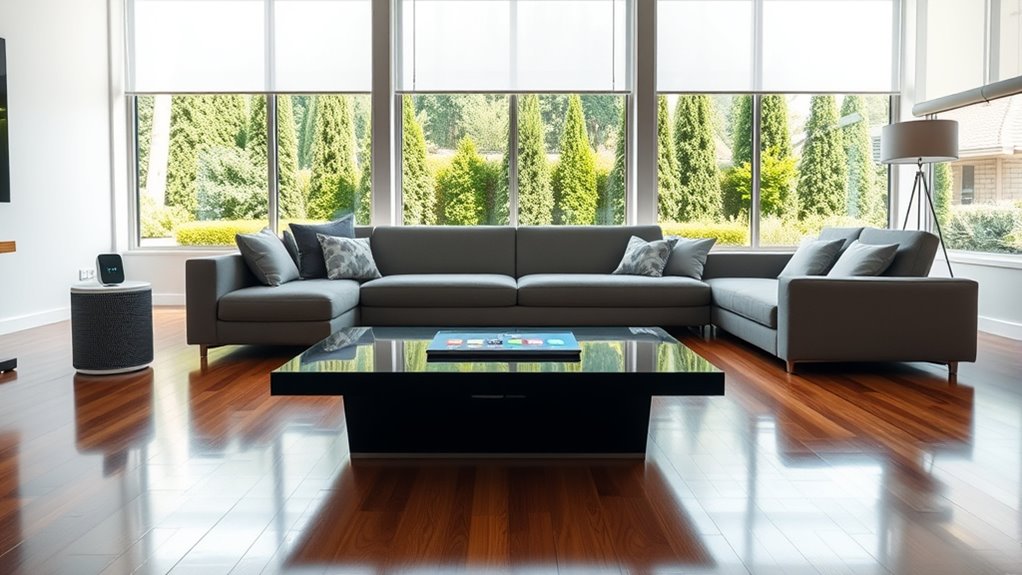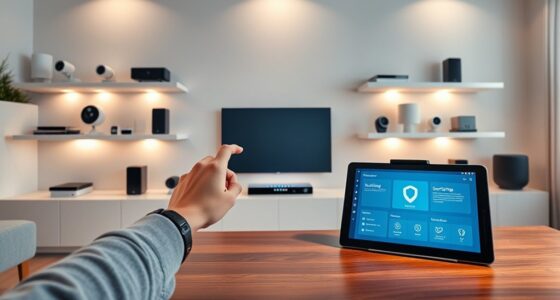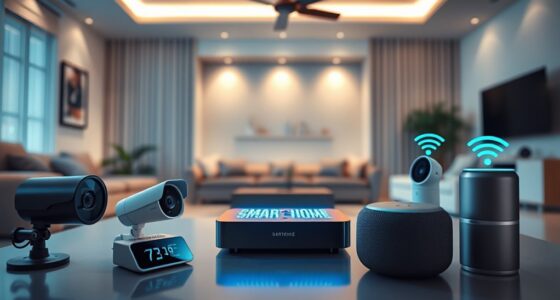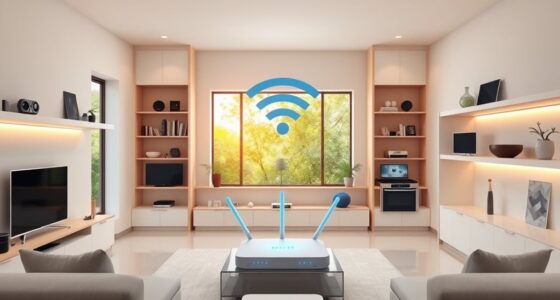Adding smart home gadgets can boost your property’s value by improving security, energy efficiency, and overall appeal. Buyers see modern tech as a sign of a forward-thinking, updated home, which can lead to higher offers and quicker sales. Features like automated thermostats, smart security systems, and energy management tools not only enhance daily living but also demonstrate long-term savings. Keep exploring to discover how you can maximize these benefits for your home.
Key Takeaways
- Smart home gadgets boost property appeal, attracting buyers seeking modern, tech-enabled homes.
- Enhanced security and energy efficiency features can justify higher listing prices.
- Integrating smart devices can lead to quicker sales and potentially higher offers.
- Energy savings from smart thermostats and lighting contribute to long-term property value.
- Modern smart technology demonstrates property adaptability, increasing market competitiveness.
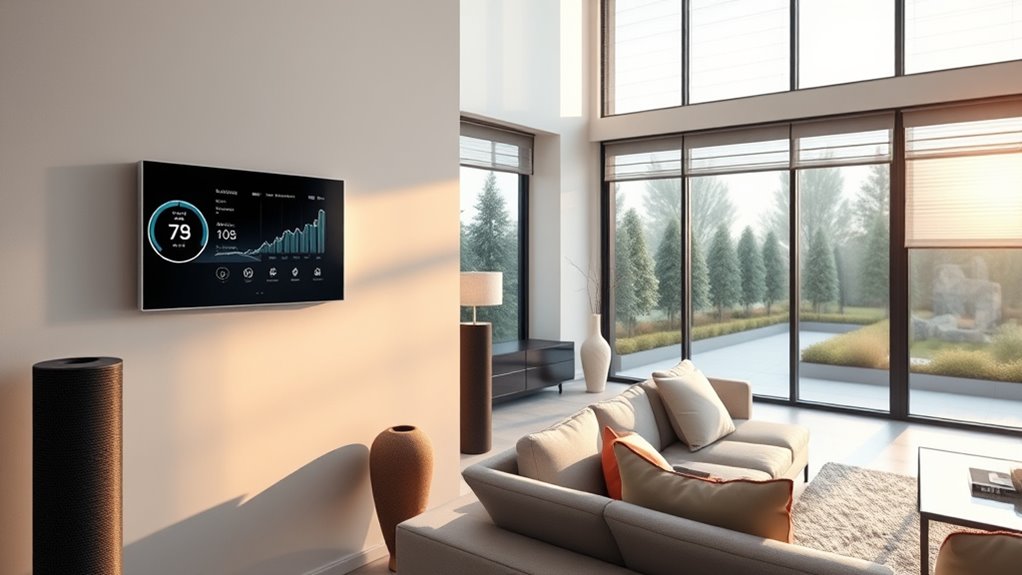
Investing in a smart home can deliver significant returns, but understanding its true ROI helps you make informed decisions. When evaluating how gadgets impact your property value, consider both tangible and intangible benefits. Smart devices can boost your home’s appeal by offering increased energy savings and security enhancements, which are increasingly important to modern buyers. These features not only make daily living more convenient but also reflect a forward-thinking approach that many buyers find attractive.
Energy savings are one of the most compelling reasons to invest in smart home gadgets. Automated thermostats, smart lighting, and energy-efficient appliances allow you to reduce utility bills considerably. Over time, these savings can add up, making your home more cost-effective to operate. When prospective buyers see smart energy management systems in place, they recognize the potential for lower ongoing expenses, which can translate into a higher property value. Plus, the environmental benefits appeal to eco-conscious buyers, further enhancing your home’s desirability.
Security enhancements are another critical factor that can positively influence your home’s value. Smart security systems—featuring cameras, doorbell video, smart locks, and motion sensors—offer increased safety and peace of mind. These devices can be monitored remotely, alerting you to any unusual activity in real-time, making your property more secure. When potential buyers see integrated security features, they often perceive the home as safer and more modern, which can justify a higher asking price. Additionally, enhanced security can reduce insurance premiums, adding financial incentives for homeowners and future buyers alike.
Beyond these tangible benefits, smart home gadgets also contribute to an improved overall living experience. They add a layer of convenience and modernity that can differentiate your property in a competitive real estate market. Buyers are increasingly seeking homes equipped with the latest technology, viewing them as more efficient and ready to meet their lifestyle needs. This perception can translate into quicker sales and potentially higher offers. Incorporating smart technology can also demonstrate a home’s adaptability to future innovations, making it more appealing to tech-savvy buyers.
While the initial investment in smart home technology can be substantial, many of these gadgets pay for themselves over time through energy savings and reduced maintenance costs. Furthermore, the appeal of modern security features can make your property stand out, increasing its marketability. Ultimately, integrating smart systems into your home isn’t just about convenience; it’s a strategic move that can enhance your property’s value and offer you a better return on your investment in the long run.
Frequently Asked Questions
Which Smart Home Devices Offer the Highest Return on Investment?
When choosing smart home devices, you want to focus on those that offer the highest return on investment. Security systems are top contenders, providing both safety and potential property value boost. Voice assistants enhance convenience and appeal to tech-savvy buyers. These gadgets not only improve your living experience but can also make your home more attractive to future buyers, ensuring your investment pays off in the long run.
How Long Does It Take to Recoup Smart Home Gadget Costs?
Sure, you’re probably wondering how long it takes to recoup your smart home gadget costs. Ironically, it varies — sometimes just a couple of years, other times over a decade. Your investment timeline depends on factors like device costs, energy savings, and home appeal. Fundamentally, you’re looking at a mix of quick wins and long-term benefits, making cost recovery a bit of a waiting game — but worth it!
Do Smart Home Features Influence Property Insurance Premiums?
Smart home features can influence your insurance premiums by offering insurance discounts, as insurers see them as reducing risks. When you install smart gadgets like security systems or smoke detectors, they often lead to favorable risk assessment outcomes. This means you might pay lower premiums because your home is considered safer. Check with your insurer to see which smart features qualify for discounts, helping you save money long-term.
Are There Specific Neighborhoods More Receptive to Smart Home Upgrades?
Think of neighborhoods as gardens, thriving where the right conditions exist. You’ll find areas with progressive neighborhood demographics and evolving local real estate trends are more receptive to smart home upgrades. These communities embrace innovation, making smart gadgets feel natural and valuable. In such neighborhoods, your upgrades become not just modern touches but symbols of foresight, attracting tech-savvy buyers and boosting your home’s appeal.
How Do Smart Home Gadgets Impact Energy Savings and Utility Bills?
Smart home gadgets boost your energy efficiency by automating lighting, heating, and cooling systems, which helps reduce utility bills. When you install smart thermostats and energy monitors, you gain better control over your energy consumption, leading to significant utility savings. These gadgets make it easy to optimize energy use, so you save money while making your home more eco-friendly. Overall, smart home tech directly impacts your utility bills in a positive way.
Conclusion
So, while installing all those smart gadgets might make your home feel like a sci-fi set, don’t expect a quick ticket to riches. You might just end up with a high-tech fortress that’s a pain to sell or rent out. Ironically, the same devices meant to boost your property’s appeal could leave potential buyers more confused than impressed. Sometimes, a simple, cozy home beats the latest gadgetry when it comes to real value.
